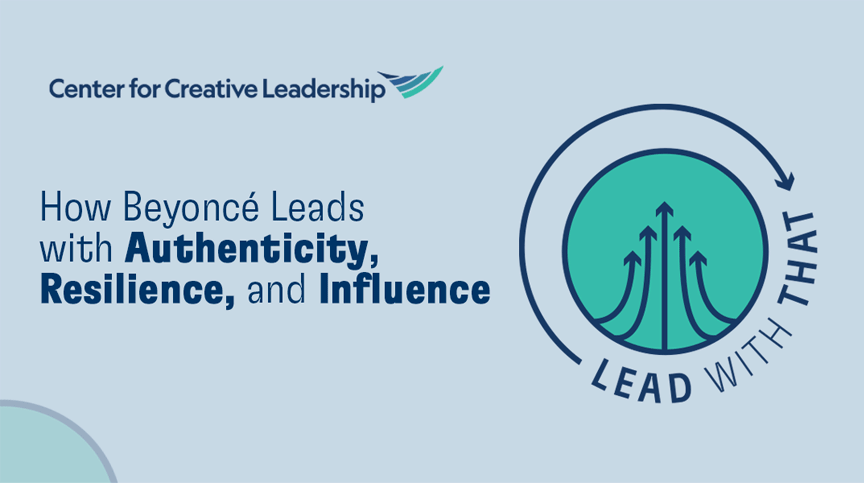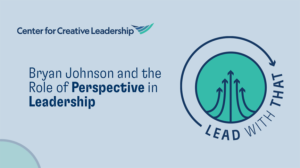- PODCAST
Lead With That: How Beyoncé Leads With Authenticity, Resilience, and Influence

In this episode of Lead With That, Ren and Allison discuss superstar Beyoncé and the leadership lessons we can learn from her music, business, and philanthropic accomplishments. From being a member of ’90s girl group Destiny’s Child to her wildly successful solo career, Beyoncé has worked to become a dominant force in the music industry and beyond. Not only has she achieved unparalleled success as an artist, but she has been hailed as an innovator, influential leader, and unwavering advocate for the rights of many marginalized groups — working to pave the way for those who come after her. Beyoncé is proof that authenticity, resilience, and influence are valued aspects of leadership. Listen in as Ren and Allison discuss what it would be like to work with Beyoncé as their manager.
This is the third episode in our special Lead With That series, “Manager Madness,” where we discuss public figures, real or fictional, who embody leadership through both their actions and ability to inspire others. Our listeners voted in a “Manager Madness” bracket on social media stories to rank which leaders they would want to work with the most. Over several months, Ren and Allison will be chatting about each of them one by one until we reveal the winner.
Listen to the Podcast
In this episode of Lead With That, Ren and Allison discuss all things Beyoncé. From her music and business ventures to her philanthropy and advocacy, Beyoncé serves as a source of inspiration and influence for people all over the world. Allison and Ren explore what it would be like to work with Beyoncé, and Lead With That.
Interview Transcript
INTRO:
Welcome back to CCL’s podcast, Lead With That. We talk current events in pop culture to look at where leadership is happening and what’s happening with leadership.
Ren:
It’s manager madness Allison, again, where we one by one discuss public figures, real or fictional, randomly pitted against one another to see who comes out on top. Today, Beyoncé. That’s right, the Queen B herself. We’ll be spotlighting one of the most iconic figures in contemporary music in pop culture. From her early days as that powerhouse vocalist of Destiny’s Child to her unparalleled solo career, Beyoncé has consistently redefined the boundaries of artistry, entrepreneurship, and leadership.
Now, emerging onto the scene in the ’90s, Beyoncé quickly became a household name with Destiny’s Child, achieving massive success with hits like “Say my name, say my name.” Allison, you remember. Or, “I’m a survivor. I’m not going to” … Isn’t that wild? That just blows my mind. We’re probably going to get struck or bleeped because I’m such a good singer. But anyway. It’s really her solo career that catapulted her to superstardom.
With albums like Dangerously in Love, B’Day, and Lemonade, Beyonce has not only topped the charts, but she’s also cemented her status as a visionary artist, blending genres and pushing artistic boundaries, as most recently breaking records, as she seems to do all the time, with her latest single, Texas Hold ‘Em. The superstar is trying some new things, jumping into the country world headfirst. Even Dolly [Parton] noticed, saying, “I’m a big fan of Beyoncé and very excited that she’s done a country album. So, congratulations on your Billboard Hot Country number 1 single,” Parton wrote.
But past the music, Beyoncé’s leadership extends far beyond the stage. She has consistently used her platform to advocate for social justice, women’s empowerment, racial equality. And from her groundbreaking visual album Lemonade, which delved into themes of infidelity and forgiveness, Black womanhood, to her advocacy work with organizations like BeyGOOD, Beyoncé’s leadership style is characterized by authenticity, resilience, and commitment to using her influence for positive change.
So, as an artist, entrepreneur, and philanthropist, Beyoncé Knowles continues to inspire and lead by example, leaving an indelible mark on the music industry and beyond. So, welcome back everyone. I’m Ren Washington. As usual, joined with Allison Barr. Allison, if Beyoncé was your boss, what would you be excited about? What would you be worried about?
Allison:
I would like to first back up, because I did not know you were going to sing for us this morning, which I’m very grateful I had the opportunity to hear your solo.
Ren:
You’re welcome.
Allison:
And I am a little bit disappointed you did not sing my favorite Beyoncé song, but that’s okay. I won’t lose too much sleep over it this evening.
Ren:
What’s the favorite song?
Allison:
Formation. Hands down. Formation. Do you know that one?
Ren:
I probably need someone to refresh my memory of what it sounds like, and that person might be you.
Allison:
Oh, I don’t think today is the day for that, but maybe some other time.
Ren:
You should have done it.
Allison:
You can give it a Google. But what I will tell you is that … what did I say? How old did I say I was in the last podcast? 26.
Ren:
I think we were in our 20s, I think, the last time.
Allison:
We were in our 20s. I was just a young teen when that song came out, and I used to practice the dance to it in my friend Stacey’s living room for hours and hours and hours. Anyhow, maybe towards the end, you can give us your personal rendition of that song, and we can go from there. But to answer your question. What would concern me and what would excite me if she was my leader? Is that the question? Those are the questions?
Ren:
Yeah. 2-parter.
Allison:
I’m digging here because what would make me nervous is that I have heard … so this is based on speculation only. I have heard that Beyoncé does not sleep much, and that she works more hours in a day than most people would comfortably, and can function very well on little sleep. I am not one of those people, so if my working hours were expected to be upwards of 12 hours consistently, I don’t think that that would be a good match for me. I don’t think I would produce my best work.
What would excite me is there are a lot of things that you’ve mentioned already around her innovation, her talent, but I think what excites me the most is a quote that I found from her, and that quote is, “I don’t like to gamble, but if there’s one thing I’m willing to bet on, it is myself.” And I really like that type of confidence in a leader. What about you?
Ren:
Yes. I don’t know. I’m wondering if I’m always going to be like, “the double-edged sword of their greatness is their greatest flaw,” but I probably would be really inspired by her doggedness, her drive, the way that she’s been able to maintain power and consistency. And that’s really interesting. That’s super inspirational. We’re going to be talking about a career that spans 30 years, really longer than that, because she’s been singing since she was a child, she was beating adults when she was 7 years old. But I think just her evolution and her consistency is really amazing.
I think one thing that I might be worried about, not knowing her at all, is I feel like she’s not only a sun, she’s a universe. And by the way, she’s married to another really prolific person who has, by the way, one of the most prolific businesses in their industry. And so, how do you not show up as a number in an organization and for a person who’s just got the world to consider?
So, I maybe get lost in the wash. I might worry that I would have to be inspired by her leadership, maybe not led directly by it.
Allison:
Did you say that you would worry about feeling like a number? Is that what you said?
Ren:
Yeah. I’m just maybe comparing that to anyone who’s listening who works in an organization that just has so many people that it’s impossible maybe to feel like, “Oh, we’re an organization of 20 people.” I don’t know if she treats people like numbers. But if I’m in an outfit, like think about a world tour, which has anywhere between 10 to 20 semi-trucks that follows her around. If you’re on that crew, there’s probably a lot of effort she’s got to put forth to make people feel welcome. And I imagine she does, but I’d be curious how much self-drive I would need to feel seen in a universe where I’m just a speck of dust.
Allison:
Is it important to you, in your work, that you have some connection to the CEO? We’ll assume that she’s the CEO. Is that important to you?
Ren:
That’s interesting. I like to think that I let people amplify me, and so I don’t need a CEO to inspire me. I find a lot of other drivers. I think you and I talked about this. I’m just excited about work. I like to do what I do. I’m trying to make a difference in this world. That inspires me. I don’t need someone else to do that for me. But if they were inspiring it, sure, it wouldn’t hurt. And so, I think working with people who seem just totally uninspired or disinterested in what we’re all here to do is boring. I don’t want to hear them speak. I just want to get to work. So I don’t know. That’s a pseudo-answer. Does it matter to you?
Allison:
That is a pseudo-answer. To have a connection to my CEO? I don’t think so. Well, I am baffled by my own question, because what do I mean by connection? We hear from our CEO, and I appreciate that. And I appreciate his candor and, to the extent that he can be straightforward, I appreciate that, but I don’t have a personal connection to him and that’s okay. I think what makes me feel like I’m not a number, I suppose, is the way the messaging is communicated. I suppose that’s important to me, more so than a personal connection.
Ren:
Probably what’s coming up for me is maybe the environment. I don’t need to be shaking or high-fiving my CEO’s hand. It’s not necessary. I do wonder, is there an environment that they create where the message reaches me and I believe it? But also, do I not see a message or hear something and go like, “Whatever, dude,” or “Whatever, dudette. You’re Beyoncé. What do you know about my trials or tribulations? I clean the bathrooms at the stadium.” I don’t think those people work for her team. That’s hyperbole.
But I think that’s probably the thing. How many things go unnoticed that perpetuate bad behaviors or negative impacts, like so many other organizations? Maybe that’s a good articulation of what I’d be worried about. I wouldn’t be worried about her. I’d be worried about … she’s so big, that the ecosystem around her is so massive, that maybe her truth and light doesn’t get into some of those dark corners of real business.
Allison:
That’s so interesting. I didn’t expect for us to take this route, but I’m going to keep going because it’s very interesting.
Ren:
Let’s do it. I like it. Yeah.
Allison:
What is the difference between a CEO of … we won’t use CCL because that’s too close to home. We’ll use a different organization. I don’t know, an organization of 1,000 people. And the CEO is a similar bright light, inspiring, et cetera. What makes their message hit into the dark corners, so to speak? What’s the difference? Do you know what I mean? How can a leader then reach those corners, regardless of size of organization?
Ren:
Regardless of size? Yeah. Something that’s big and important to me, I think, it’s always having … who’s telling your message the way you want your message told in rooms you’re not in? And so, I’ll often tell leaders … and you could even think about Beyoncé, Allison, and anyone who’s listening. She’s done a good job of creating a brand for herself. She has created a narrative and then put that narrative in the hands of people that she’ll never meet, who are singing her tune, pun intended.
And so, I guess that’s what I often tell young leaders is … you’re not going to be in every room. Not every person’s always going to hear what you care about, but what are you doing to make sure that your message is clear and that you’re giving it to the right people so they can carry it? I think for her, she’s got to hand it to people who are leading her armies to make sure they are shining the light in their parts of the organization.
I think it’s easier in a 1,000-part organization. Think of a bright star like Beyoncé, her light might shine bright enough to engulf 1,000 people. But an organization like one of the super houses that we know where there’s 800,000 employees, I don’t know how bright a light you can have that’s actually going to reach down there, especially if people below you are casting their own darkness and shadow because they aren’t bought into the message.
Allison:
Right. And that’s an interesting statement too, because if we think about those super organizations that are as big as you just mentioned, by technical standards, they’re very successful. I’m noodling on this a lot because how important … from a business, if we’re talking about business and not necessarily Beyoncé’s business, but to our leaders that we interact with … how important is that? I don’t know, to the success of a company. It’s important. You and I, I think, are aligned that it is important, but how important is it for the success of an organization overall? I don’t know the answer to that.
She’s incredibly business-savvy. She’s incredibly innovative. You already said this. She’s empowering. She’s decisive. She fired her manager of 15 years, I think that was in 2011, and then took full financial responsibility of her own business, businesses rather. And she’s been full steam ever since and probably before that too. So, she is incredibly decisive. And I wonder if someone like Beyoncé has such a clear standard for her businesses that there’s no questioning what behaviors are welcome and what are not.
Ren:
I always wonder, too, do you think that Beyoncé’s got leadership competencies that, if you get paid by Beyoncé, that you have to abide? Now, she does have an organization called BeyGOOD, and I want to talk about it a little bit. And that’s a charitable organization that just does immense things attached to her name, her image, her brand, her tours, from food to clothes donations to just helping young people experience music and art. I mean, talk about a way to funnel your energies. But I wonder, if you’re going on tour, do you like, “Look, okay, cool. We are courageous. And by that, we mean these 5 behaviors.”
That’s a curiosity. I do wonder, but go back to your success. It’s funny, I was writing this down because one of the first things I look for when we talk about these characters is their net worth, especially someone this big, according to Forbes in 2022, $450 million net worth, Beyoncé herself. And I think net worths are this weird, amorphous idea, but it conceptualizes maybe this idea that she’s a powerhouse, ranked 61st among America’s wealthiest self-made women by the same Forbes article.
But when I think about what is success, I probably go more towards her impact on society and her impact with BeyGOOD, less around her financial standard or capabilities. Because that brings into a larger conversation, that I don’t know if you and I will ever get that episode to air, around what societal structures we need to be engaging in to make the world a better place. Anywho, I don’t know.
I think probably like, to success, let’s go with BeyGOOD. And I wonder, can Beyoncé articulate the behaviors that she wants to be around that amplify her leadership, that enable other people to lead like her? That’d be cool. I’d like to ask that.
Allison:
Yeah, it’s so tough, too, because when we talk about Beyoncé, we’re talking about an entertainer and businesswoman and innovator and … There’s so much to say about her that is innately inspiring, and I think that people would naturally follow her regardless. Honestly, I think people look up to her, like a lot of other entertainers and business people. But I think to your point, she’s also done a lot of good for society and people who are underprivileged. So I think there are some natural qualities that she has, that people would naturally try to emulate, that we may or may not see in the general workplace. Some of us might, but I don’t know that it’s as common.
She’s a human. I’m sure she has her pitfalls as well. But what stands out to me about her, and what I’ve read about her, is her savviness and her innovation. Like you said, she’s been in the business for 20-plus years, in the entertainment business that is, and her style never gets old. And that’s because she frequently reinvents herself. I don’t know if anyone’s coaching her on that. I have no idea. I would imagine she has a powerhouse team as well. But from what I understand, she drives most of those decisions.
If we’re linking that to the general work worlds, it is important to have some foundation on your, dare I say “product” or your brand, but also be able to reinvent frequently, which is a hard balance for organizations.
Ren:
Yeah, I remember when she left Destiny’s Child, it was like … people rarely succeed when they’d go on solo careers after leaving their bands. And I think you see that in music, but music’s also so finicky. I think there’s something there. Something too, though, that you said earlier around this idea of emulation. I wondered and I guess … you said, talking to you about a team that she has around, or how she maybe manicures her reputation … I guess when you have to manicure your public image and you are Beyoncé, so your public image is you’re a world figure, you’re known, then there’s a lot of behaviors to emulate.
But let’s take any CEO that you can think of. Are they as visible for behaviors to emulate? If someone is a bright light, but they’re not giving examples for it, then are they going to create that natural followship that Beyoncé will? And then, too, I mean, we talk about the complexities of humans. We know that Beyoncé is a human and that she’s not perfect. It’s like that old adage, never meet your heroes, because you find out that oh crap, they’re a miserable human being just like me.
Inevitably, all that glitters won’t be gold, and Beyoncé will have a bad day as a mother and as a business woman and as an entertainer, and she might let that spill out onto the people around her. And then, that might even be harder to take because she’s been deified. A couple of ideas there, but maybe what do you say to a CEO who’s not got as much visibility there, or how would you react to that?
Because I think people can emulate her, but only because she’s on the highest stage in the world. How do other leaders create an environment for emulation?
Allison:
That’s a tricky question because Beyoncé originally, by trade, is an entertainer and CEOs are not. I wouldn’t expect my CEO to entertain me though. It would be amazing and hilarious if they did. But that’s not my expectation, and the clarity that I have on what I’m expected to do at the workplace, I’m clear on that. I think you and I have unique careers and unique jobs because the inspiration … I won’t speak for you, but I’m curious what your thoughts are.
The inspiration that I gain at work mostly, not holistically, but mostly comes from being in the classroom with clients. It is so engaging and inspiring to me and life-giving. I don’t seek that inspiration from my CEO necessarily. What do you think?
Ren:
Yeah, I think we mentioned this earlier around having personal pride or a personal mission. And I think that’s why you and I have often said, and I’ll say it again, everyone … My wife and I just did a values exercise, Heather. I want to stop calling her my wife …
Another departure. I was with a colleague of mine, and he continued to refer to his wife by her first name. And I kept on saying to myself, “Who is this person he’s speaking about?” He was talking to other people, and I thought, “What an interesting intention.” I haven’t asked him about it, but Harrison, shout out, you’re a great guy. He’s a really thoughtful, grounded person. And I was thinking to myself, “It’s interesting how we identify these people by titles.” And then, I was also thinking to myself though, “Well, maybe it’s because I’m a private person and you don’t need to know what my wife’s name is.” But you do know my wife’s name, and all of you are engaging in parasocial relationship with me anyway. So, my wife’s name is Heather. We’re public figures. Sure, whatever. Thanks for that departure.
Heather and I were doing values exercises, and a new value rose of the surface for me, which was self-respect. And one of the first ideas around self-respect was self-acceptance, being proud of yourself. And I think naturally, in order for self-acceptance to come, I think you’ve got to have self-awareness, like what makes you proud of yourself?
I’m not perfect. I have loads of work to do, but I would say that, yeah, you and I probably have worked to synthesize what we find pride and joy in, and then we don’t need anyone else shining that light for us. And I think I agree with you. But when I wonder about someone who’s less clear, or who might need some guidance, I wondered … you said CEOs aren’t an entertainer.
Well, what is a CEO? Because I think sometimes the CEO can inspire apathy or excitement, and I’d rather them inspire something than nothing. And so, if I have a CEO message where I’m like, ugh, then that might just be enough to make me look for someone else.
Allison:
Again, it’s a tricky question, because it depends on who you ask and, perhaps, what you value, maybe? CEOs, by trade, oversee organizations. Based on my position where I am right now, I don’t directly report to the CEO. I’m not even in the same geographic location. I’ve had some interaction. I’ve been lucky to meet CEOs in my past careers prior to CCL, of course. And again, I don’t want to overuse the word inspiration, my drive, my excitement around coming to work had a lot more to do with my colleagues and the work that I was actually doing versus my CEO.
I’ll share with you that one of my best friends and I were having a similar conversation. I won’t say where she works, but it is a larger organization and well-known. And the CEO is less than inspiring, and that’s important to her. We had a conversation about it. One of the questions I asked her is, what is the CEO’s responsibility to you feeling engaged at work? Is it your manager? Whose responsibility is that? Whose responsibility is it that you feel engaged at work? That’s rhetorical, unless you have an answer to that, Ren.
Ren:
All of us. I am of the extreme ownership, like personal accountability standpoint, so me, I have no one else to blame about anything in my life other than me. I create the realities I’m a part of. But in reality, I also cannot ask an individual to say … like, people have the right to ask for things, just as I have the right to not ask for them. We talk to leaders all the time where we’re like, “Can you teach a sense of urgency?” And I work with a whole bunch of really smart, driven people who will look at me and just shrug their shoulders and say they don’t get it. They think it’s an overabundance of nature versus nurture.
And I guess what I’m trying to explore right now is, what are those nurturing aspects? A question that we’ll ask for all of our leaders, and I’ll ask you this now, would you want Beyoncé to be your leader, or would you want Beyoncé as your leader?
Allison:
Would I? Yeah, in a heartbeat. What I’m pulling into that too though, is the assumption that I would also be working … well, how many businesses does she own now?
Ren:
You can almost pick which one you’d want to work for.
Allison:
Yeah. Who knows? If it was in the entertainment industry, maybe not, because that industry is rough. And again, I value my discretional time. I value my relationships, my personal relationships, now more than ever. If it was the entertainment industry, maybe not, but if it was one of the others, sure.
Ren:
Because you think that it would provide for you the things that you value, discretionary time, time with colleagues?
Allison:
I think so. I’m just riffing here because I don’t know. We’ve got to talk about what position I have and all of that. If it were something in leadership development, organizational development, people development, then yeah, absolutely. Absolutely.
Ren:
Well, let’s chase a rabbit that we were talking about earlier, and we were talking about the CEO. Do they need to keep you inspired? Let’s say you had to work for her, Beyoncé, in the entertainment industry, like something you’re unfamiliar with, where you aren’t naturally driven by, like where you right now said, “Okay, you’re making a switch.” Tomorrow, you’ve got to go close business, and you may not have the time to switch your heuristic of “I’ve got pride in myself in the work that I do here.” What would keep you in that job? And would she have a part in it?
Allison:
What would keep me in the music industry?
Ren:
Yeah. The part of the thing that you were reticent to join. You’d have to work for Beyoncé, but it wouldn’t for BeyGOOD, her charitable organization as her L&D director. It would be in her entertainment and touring industry as, I don’t know, something not glamorous.
Allison:
Something not glamorous. I don’t know. I feel like this is a hard question because I need more details.
Ren:
But why do you need more details?
Allison:
I can tell you … I mean, because —
Ren:
Because you’re trying to create an environment that you would be satisfied with, that doesn’t involve your CEO creating an environment that you’ll be satisfied with?
Allison:
Well, I think because what I value, my values as such as they pertain to the workplace, vary slightly. So, the work that I do now, the actual work that I’m responsible for, I mean the things that I produce, I very much enjoy it. I am very much interested in it. I believe in it. I like sharing it with others. I think it’s valuable and important. Have I worked a job, though, where I didn’t feel that and been happy? Yes, because I had my other values met.
And the thing is, music is a very big part of my life. I love music. There’s a guitar sitting to my right and a piano sitting to my left. Am I Beyoncé? No. Would I have some pride working in the music entertainment industry? Yes. And from what I hear and understand, it’s a no-sleep type of industry. And that does not appeal to me.
Ren:
Is there anything that Beyoncé could do with her leadership behaviors or style that could make that more appealing to you?
Allison:
Yeah, if I had just regular normal working hours, yeah, I’d be okay with that.
Ren:
The thing that Beyoncé could do for you from a behavioral standpoint would be shift your schedule. That’s what you’re saying, which is fine. I like it. But that’s what you’re saying.
Allison:
We’re talking about something that’s out there in the ether. I don’t even know what my job is at this point. So again, I would —
Ren:
Yeah, it’s a hypothetical.
Allison:
I’d probably need some more information. But if you’re trying to get me to investigate — what are you trying to get me — what’s the bottom line here?
Ren:
Well, we’re asking would you want to work for Beyoncé. And the answer is yes. And if it’s yes, well, why would it be? I’d say yes too, but probably because she’s so wealthy that if I’m on tour, I’m probably getting a nice bonus. But is that why I want to work for a person, or do I want to work for a person because they have clarity of vision, or they’re able to communicate that sense to me, or they get my discretionary effort function? If you’d say yes to her, would you say yes to her in a job that you hated? And if so, why? What about her characteristics would keep you there?
I think, too, it’s attached to the thing we were talking about. Do you need a CEO to inspire you to work there? Well, no, but you and I have the luxury of choice. What if you don’t have the choice? What if your only option is working in an environment and in a workspace where you’re uninspired and maybe not even treated that well, what behaviors could we take from Beyoncé to change that environment?
Or if you were in a crappy situation as a tour manager, as one of the tour managers in Beyoncé’s entertainment circle, what characteristics do you think would inspire you to do that job that maybe you’re a little unfamiliar with in an industry that you’re not super excited about? What characteristics would you say, “Yeah, I want Beyoncé to be my leader?” I mean, I know we don’t know her.
Allison:
Can we flip this? Because I am curious what you would say.
Ren:
Would I want Beyoncé to be my leader personally? From what I know about Beyoncé, would I be satisfied to work for her? I think I would, despite the fear or apprehension of maybe getting lost in the system, because the truth of the matter is you’re all numbers anyway. No, I think that the world does not care. So, instead, I attach myself to the things that she cares about. I think a lot of our work out there, and if you’re listening and you hate your job, make part of your job finding your next job.
And so, I probably want to work for Beyoncé and move my way into the BeyGOOD foundation, do something in that organization. So sure, I’d probably want to work for her for the potential that her universe has created, even if she never knows who I am. Flip success!
Allison:
And I’m going to share my unpopular … maybe, I think it’s unpopular opinion, it might not be. And then, I want to hear more about your draw towards her BeyGOOD foundation.
Ren:
For sure.
Allison:
Sometimes I think that we expect too much from workplaces. I am not saying that we should accept hostile treatment, so please do not make me a soundbite. That’s not what I’m saying. What I am saying is that I was hired to do a job, and I go to work, and I do that job, and I do my best, and I make mistakes sometimes, and those things happen. And … to your point, right now, I do have the luxury of choice and not everybody does. And that might be a separate conversation. But my point is there are so many articles out there, and so many things that we talk about, with regard to the workplace almost being everything to people. That’s impossible. It’s impossible.
You cannot please everybody, because people are different. People value different things. I don’t know if that’s a polarity. It feels like there’s a polarity in there somewhere. But workplaces cannot be the be-all for everybody. It is absolutely impossible. Curious what your reaction is to that.
Ren:
Well, it reminds me of a conversation we’ve had before, where we were talking about work from home and building community. I think what I’m hearing from you is that our frame of reference around the workplace might need to shift. And we might be looking for too many things, especially as it relates to self-respect, or self-acceptance, or self-satisfaction. If we’re waiting for our boss or our workspace to satisfy us, then you’re going to be waiting. You need to be cultivating that garden on your own. So I think I hear what you’re saying from that standpoint.
I think it’s probably a bigger picture, though, when we [think] about what matters for success. I think, for what matters for success now, if we’re tracking financial outcomes, then sure, these things are probably irrelevant. We’re probably looking for the wrong things in the wrong places. But if we were to shift the conversation of what success looks like … where we weren’t talking about money earned, but maybe money spent on feeding people, that’d be an interesting cultural conversation as a world.
And so, I think maybe you’re right, we are seeking too much from the world today, but I want more than just being hired to do a job and then do that job around people who I can tolerate. Not saying that’s what you’re saying, but I think maybe —
Allison:
Yeah, that is not what I’m saying.
Ren:
No, that’s what I’m saying. That’s what I’m saying. I think that I want more. I want something different. And maybe that’s why I’m drawn to her BeyGOOD, because she’s a prolific businesswoman who’s got a lot of business functions, of business units rather, different arms of that $450 million empire. But the part that I am most inspired by is the part of her that’s using her name and her light to give back to others. So, I don’t know where we wind it, or how we got to this one necessarily. I guess maybe answering would I want her to be my boss, yeah. And it wouldn’t be bad to get a bonus, because I bet she bonuses her people fat.
Allison:
Maybe, right?
Ren:
I bet on the tour they get a good bonus.
Allison:
It sounds to me like you’re drawn to the mission of her foundation and the work that they contribute to society. And let’s be real. If I worked for Beyoncé, and on the entertainment side, it’s unlikely, though it pains me to say this, it’s unlikely that I would be hanging out with Beyoncé on a daily basis, which to me would be very intriguing. It’s more likely that I would be, I don’t know, managing some of her people or something. If we try to translate my role to her world, which I don’t know that we can, but I’m going to try, it’s unlikely that I would have any sort of connection to her directly.
But I still would find it to be really unique and interesting to be part of what she is contributing. It may be another podcast. But music is very important to me, and I do think it’s important to the world. When things are hard for people, they generally turn to art in some form, and music is one of those things. So. All that to say, yes, I would work for Beyoncé in a heartbeat.
Ren:
To be around the positivity that she brings. And I think that’s something, too, that we can agree on. And I just saw something that I wanted to ask, just to poke the bear a little bit, which is to say, I’m keen to hear your perspective on her, like early in her career, she dealt with a lot of things like Ban Bossy versus Embrace Bossy. Or is she like many young women in a patriarchal society, where if sex sells, they abide by the business that mandates how they make progress. And then, people are like, “You’re not a good role model.”
We’re rounding up towards maybe the end of the show. I don’t know if there’s a quick answer to how do we reconcile our puritanical prudishness with people’s ability to be role models, but maybe that’s a different episode. I don’t know. Do you have a quick answer to that?
Allison:
Well, can you ask me —
Ren:
Because I don’t have any problem with her dress. Yeah, it was like —
Allison:
Well, let me pause you right there. Whether or not you have a problem with her dress is irrelevant. And I appreciate —
Ren:
Well, I don’t think so.
Allison:
Here’s why. Well, there’s a lot of reasons why. You asked if I have an easy answer and I do not. Maybe we could … I don’t know. Let me just say what immediately comes to mind is that she’s … well, I’m making some assumptions here, so allow me. She’s being herself. If she’s wearing a crop top and a short skirt, okay. If you can’t help but stare at her, not you, I mean the general you, that is a you problem and you are objectifying her. I appreciate that she is who she is. I think it’s a much bigger conversation. And her being a role model, I mean, you brought up patriarchy and … you didn’t say feminism, but I’m bringing that up.
The “new wave of feminism” is that women do what they do for them, and are not necessarily making choices based on what you think. So, if she wants to not shave her legs for the rest of her life, okay. Do you know how people would lose their minds if that happened? When we’re talking about her being a role model, look at what she’s accomplished as a business person versus what she looks like. What she looks like is irrelevant.
Ren:
Well, and that’s exact … I couldn’t agree with you more. Absolutely. I think it’s just a nuisance when people will juxtapose her physical appearance to her capabilities or anything like that. And when I think about people being who they are, I start to think about, well, what subconscious things are we modeling around who we are supposed to be anyway, but another massive conversation. So, yeah, I think you —
Allison:
You’re hitting deep questions here.
Ren:
They’re all deep. We’re all doing the work. This is going to be a spicy, fun year, everybody. And I think maybe that’s, too, if we start to finish, I think something about Beyoncé that I might … one thing that she does that I would do, a couple of things maybe. I think it’s clear that she’s been able to explore herself and do some work. I think you’re not this successful for this long if you’re also not doing that growth to withstand all of the crap. So I think whatever she’s doing, I’d love to hear how she continues to make peace with herself and the world around her.
And maybe, too, I’m reminded of her alter ego, Sasha Fierce, when she was younger. It’s so amazing, all of us, every profession, like all these really super proficient people at one point or another have dealt with imposter syndrome. You’re not alone out there if you’re feeling like you don’t belong. Because Beyoncé didn’t think she belonged. She had to create an alter ego to get out there. I was like, “I love that. Do whatever you got to do to put yourself out there.” Because your brain does not know the difference.
So, whether you’re Sasha Fierce or Beyoncé Knowles, when you’re doing the thing that you’re scared to do, you start to build the ability to withstand your fear and get better at it. So, I think, yeah, we agree. I like Beyoncé. I think she’s a role model. I’d be glad to have her as a role model and a role model for my people.
Allison:
Well, I think the next episode, I won’t make you answer it now, but next episode, you’re going to have to share with us what your alter ego is. What is Ren’s Sasha Fierce?
Ren:
I’ll have to really think of that.
Allison:
And I agree with everything that you said, and will add that, from a business perspective, I think what our leaders can think about is how she really continues to improve over time, while still she really does meet the needs of her audience, so to speak. And if you think about business, very simplified, very, very simplified, a business standard is to move an idea into a product or to create a product for your audience, for your consumer. And competitors might create or try to create a similar product to her in response to her success. However, there’s no other artist in her genre that even comes close to mimicking her style with success.
She remains very true to her core offering, if you will. So, I think she does a really good job of leveraging tradition and innovation, leveraging who she is and what her core offerings are, and also leveraging innovation to your very earlier point, creating some country tracks. She’s still Beyoncé and has found a way to innovate and still remain who she is. And that is a business challenge that I think a lot of businesses face. So, that would be one of my key takeaways for her.
Ren:
Yeah, I love that. Be like the both / and versus the either / or. She’s like the both / and. And that’s really cool.
Allison:
Yeah. Ren, before we close for the day, are you sure you don’t want to give us one more solo? Perhaps your new song.
Ren:
(singing) “If you like it then you better put a ring on it …” And every time I hear someone say left, I always like, “To the left, to the left.” I’m not in the Beyhive. I can’t even front.
Allison:
I think you might be. I think you might be.
Ren:
You’re welcome, everybody. You owe me.
Allison:
Yes. Well, thank you, Ren, for the solo, and for your artistry ,and for the great conversation today. We’ll look to hear about your alter ego in our next episode. And to our listeners, let us know what you think. Are you part of the Beyhive? What do you like about Beyoncé? Would you want to work for her? And we’ll look forward to tuning in next time. As always, you can find our show notes and all of the links to our podcast on ccl.org. Big thank you to Ryan and Crystal and the entire CCL team that makes our podcast happen, and we’ll look forward to tuning in next time. Thanks, everyone.
Ren:
Thanks, everybody. Thanks, Allison. See you next time. Find Allison on TikTok.
| Related Solutions
Sign Up for Newsletters
Don’t miss a single insight! Get our latest cutting-edge, research-based leadership content sent directly to your inbox.









